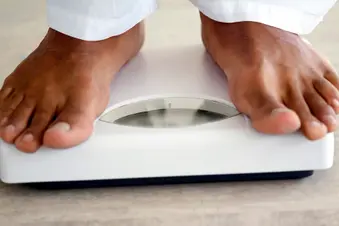
You may have noticed that your pants got tighter, or looser, after your HIV diagnosis. Weight gain and loss are both common with HIV, and they happen for different reasons.
It's important to stay healthy when you have HIV, and that includes keeping your weight in a healthy range. There are things you can do to lose any extra weight you've gained or gain back what you’ve lost.
Start by talking to your doctor. Together you can figure out the cause of your weight changes and find solutions.
How Does HIV Affect Weight?
HIV can affect your appetite or cause symptoms like mouth sores and nausea that make it harder for you to eat. You also burn more calories with HIV because your body needs extra energy to fight infections.
Weight loss used to be a big problem for people with HIV. Sometimes people lost so much that their doctors called it "wasting."
Today, HIV treatments prevent extreme weight loss. Antiretroviral treatment (ART) keeps the virus under control and stops you from getting infections. Once you're on treatment, you might actually gain weight, especially in your belly. That's because weight gain is a side effect of some HIV drugs, like the integrase inhibitors and tenofovir alafenamide.
About 1 out of 6 people gain at least 10% of their body weight within 2 years after they start ART. If you eat a lot of foods that are high in calories and fat and don’t get enough exercise, you can add more pounds on top of that.
Check In With Your Doctor
Weight is an important thing to consider when you have HIV. Gaining too much increases your risk for diabetes and heart disease. Losing too much weakens your body and makes it harder to fight infections.
Keep track of your weight at home. Let your doctor know about any change, up or down -- especially if you lose 5 pounds or more. Also let your doctor know about all the medicines you take, including ones that cause weight gain as a side effect.
Talk to your doctor about symptoms like tiredness, mouth sores, or nausea that make it harder for you to eat. Treatments can ease these symptoms and bring back your appetite. If you've lost a lot of weight, your doctor might put you on a nutritional supplement to boost your calories and nutrients.
Make Some Changes to Your Diet
A healthy diet is extra important when you have HIV. You need good nutrition to keep up your energy and strength and help your immune systemwork its best. Your doctor and a dietitian can give you advice on how to reach your weight and nutrition goals with diet.
Eating more protein and calories can help you gain weight. Extra protein also helps to strengthen your immune system. Nuts, cheese, eggs, and lean meat are all good sources of protein.
Increase your daily calorie count by adding foods high in healthy fats and carbohydrates, like peanut butter, avocado, pasta, and potatoes. Ask your doctor if you should also take a multivitamin.
If you don't have much of an appetite, eat smaller meals and snacks six to eight times a day. Small portions may be easier for you to eat than big meals. If you have mouth sores, eat bland foods that won't cause pain. Avoid spicy foods and citrus if they hurt your mouth.
If you need to lose extra weight, cut back on fat and calories. Your doctor can give you a daily calorie goal for your body type and height. Eating more nutrient-dense and calorie-light foods like fruits, vegetables, and whole grains is one way to reach your target weight.
Exercise
Exercise is an important add-on to diet. Both aerobic and resistance exercise (strength training) help you lose fat and build muscle strength.
Aerobic exercises like swimming, cycling, and walking get your heart pumping. Try to do aerobic exercise for 150 minutes a week, or 30 minutes a day for 5 days a week. Start slowly if the program is new to you. As you get fitter, gradually increase the length and intensity of your workouts.
Along with aerobic exercise, do strength training twice a week to reduce fat and build muscle. Lift weights, work with bands, or use your own body weight as resistance. Strength training can also help you maintain your weight and get a leaner body.
No matter how healthy you feel, check with your doctor before starting any new exercise program. Though exercise is safe for most people with HIV, you may have to modify your program if the virus has affected your strength or breathing.
Show Sources
Photo Credit: Medioimages / Photodisc / Getty Images
SOURCES:
Academy of Nutrition and Dietetics: "Nutrition Tips to Keep the Immune System Strong for People with HIV-AIDS."
AIDS and Behavior: "Behavioral weight loss: A promising treatment for obesity in adults with HIV."
AIDSmap: "People with HIV gain weight faster than HIV-negative people."
American Journal of Lifestyle Medicine: "Health Benefits of Exercise for People Living with HIV."
Avert: "Taking Care of Yourself When Living With HIV."
Catie: "A Practical Guide to HIV Drug Side Effects."
Cleveland Clinic: "Aerobic Exercise."
Clinical Infectious Diseases: "Weight Gain Following Initiation of Antiretroviral Therapy: Risk Factors in Randomized Comparative Clinical Trials."
Current HIV/AIDS Reports: "Obesity and Weight Gain in Persons With HIV."
FamilyDoctor.org: "Nutrition and Exercise When You Have HIV."
HIV AIDS: "Clinical utility of dronabinol in the treatment of weight loss associated with HIV and AIDS."
International Journal of Sport Nutrition and Exercise Metabolism: "Resistance Training Combined with Diet Decreases Body Fat While Preserving Lean Mass Independent of Resting Metabolic Rate: A Randomized Trial."
Journal of Acquired Immune Deficiency Syndromes: "Body Composition Changes in Response to Moderate- or High-Intensity Exercise Among Older Adults With or Without HIV Infection."
UCSD: "Diet and Exercise for HIV-Positive Individuals."
UpToDate: "Patient education: Symptoms of HIV infection (Beyond the Basics)."
U.S. Department of Veteran Affairs: "How do I keep from losing weight?"